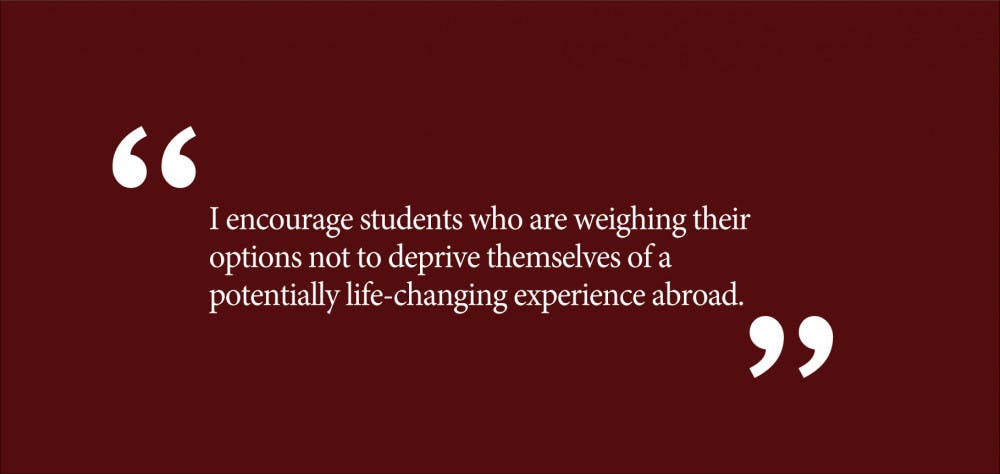Every semester, a new host of American students decide to leave their college campuses and study in another country. For the 2017-18 academic year, more than 340,000 students studied abroad. Last year, I was one of those students. I decided to try something new and learn while immersing myself in a new place, and my experience was overwhelmingly positive. I’m of the opinion that everyone can benefit from a semester or two spent abroad.
Studying abroad can inspire personal growth and allow you to discover new passions. I acknowledge that there are several reasons — including academic, financial and medical factors — why one would not study abroad. And that’s perfectly fine. But I worry that others are dissuaded from embarking on such a transformative journey for spurious reasons, such as a fear of leaving their comfort zones. Furthermore, students may choose not to study abroad when they belong to demographic groups that are statistically less likely to study abroad. So I encourage students who are weighing their options not to deprive themselves of a potentially life-changing experience abroad.
Studying abroad provides students with all of the benefits that can flow from leaving one’s comfort zone — from increased confidence to greater flexibility and resilience in confronting new circumstances. But the benefits of venturing somewhere new can be obscured by fear of leaving the familiar behind, which can daunt students enough that they opt not to study abroad.
When I went abroad to Cameroon last semester, I was definitely leaving my comfort zone. I knew very little about the country, and had never even travelled to Africa. Neverthless, studying abroad in Cameroon allowed me to grow as a person as I faced unique challenges that come with navigating a new country. I also grew as a student, studying academic disciplines with which I’d had no prior experience. Additionally, I discovered a love for traveling and a desire to familiarize myself more with other parts of the world and different ways of life. My newfound appreciation of cultural diversity has broadened my worldview, enabling me to live a more intentional life. The growth that came with leaving my comfort zone allowed me to discover something I love, which has had a lasting impact on me even after I returned to the United States. So while it’s much easier for someone to simply stay on campus with their friends and everything familiar than to move somewhere entirely new, it is worth choosing the challenge — because the benefits of going abroad may prove more fruitful than staying put in the long term.
But students may feel personally excluded by their identities from studying abroad. Students from some demographic groups are statistically less likely to study abroad. For example, male students are less likely to study abroad than their female counterparts. In the 2016-2017 academic year, men represented less than one-third of American students who studied abroad.
There is also a disparity between the percentage of white college students and non-white college students who study abroad. According to NAFSA: Association of International Educators, white students accounted for 70 percent of all American students who studied abroad in the 2017-2018 academic year, even though they represented only 56 percent of all enrolled college students. Conversely, Black, Hispanic/Latinx and Native students were all underrepresented in study abroad participation compared to their overall percentage in the American college student population.
I would not want anyone to choose not to study abroad just because the most typical study abroad student is technically a white woman, especially as a male student of color who greatly enjoyed his time abroad. Many other students of color who choose to study abroad have positive experiences: In a compilation of stories published in Essence, Black women shared how studying abroad in countries including France, China and Turkey changed their lives. Studying abroad is not an experience solely for people of a particular demographic; the experience is one that any- and everyone should have the opportunity to enjoy.
To be clear, the goal of this column is not to bully uninterested students into studying abroad. I’m simply arguing that all people who are considering study abroad should feel empowered to take advantage of the opportunity of a lifetime.
Quentin Thomas ’21 can be reached at quentin_thomas@brown.edu. Please send responses to this opinion to
letters@browndailyherald.com and op-eds to opinions@browndailyherald.com.





